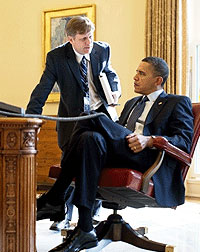Too Close For Comfort
U.S. Ambassador Michael McFaul is Becoming a Major Figure in Russia — But Is This a Good Thing?
Dan Peleschuk - Russia Profile - russiaprofile.org - 4.5.12 - JRL 2012-64
Just under three months into his posting in Moscow, U.S. Ambassador to Russia Michael McFaul is becoming increasingly familiar to the average Russian. From the outset, he has been thrust into the center of relations between the United States and Russia, and has made himself both visible and available the way few other U.S. diplomats have. But as the Kremlin repeatedly turns him into a target for criticism, might it be a sign that McFaul has come too close for comfort?

file photoAs the key architect of U.S. President Barack Obama's "reset" for U.S.-Russian relations, McFaul has since 2009 been intimately involved with U.S. policy toward Russia. More than that, however, he has a deep knowledge of Russian politics and society, as well as a vast network of both personal and professional contacts in Russia. When he was appointed ambassador in early January, many welcomed his posting to Moscow even President Dmitry Medvedev praised Obama's choice as a "tough negotiator" and a worthy ambassador.
McFaul has reached out to Russians perhaps above and beyond the call of duty to assure them he's serious about patching up the consistently prickly relations between Russia and the United States. To that end, has maintained Twitter, Facebook and LiveJournal accounts, through which he has openly communicated with figures across the socio-political spectrum, from journalists both pro- and anti-Kremlin and activists to systemic and non-systemic opposition leaders.
But there's something about McFaul that has struck a nerve in Moscow. While he seems to command respect with Russian officials on a personal level, the Kremlin has very publicly turned its guns on him practically since the day he arrived. The probable cause was his meeting, during the second day on the job, with key figures in the non-systemic opposition amidst, no less, an unprecedented protest trend that had shaken the Kremlin. Shortly after, government-controlled Channel One aired a scathing tirade by its in-house attack dog, Mikhail Leontyev, denouncing McFaul's perceived attempts to foment revolution.
It wouldn't be the last time a TV network close to the government has gone after the ambassador. Just last week, NTV, infamous for its hatchet jobs of the Russian opposition, ambushed McFaul as he was meeting veteran human rights advocate Lev Ponomaryov. But this time, it wasn't the journalist's words that elicited a reaction. Visibly flustered, McFaul battled verbally with the reporter for 20 minutes on the street, accusing producers of hacking into his personal records and even allowing himself a rare dose of criticism aimed at Russia itself. "This is a wild country, it turns out. This is not normal. This does not happen in our country," he said.
Though he promptly apologized, this series of incidents highlights the growing uneasiness over McFaul's activity in Russia. Typically, U.S. diplomats have maintained low-key but workable relations with their Russian counterparts. McFaul's predecessor, John Beyrle, commanded great respect